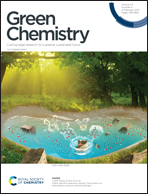Life cycle thinking case study for catalytic wet air oxidation of lignin in bamboo biomass for vanillin production†
Abstract
Life cycle thinking analysis (LCT) was conducted on the production of vanillin via bamboo wet air oxidation compared to vanillin production from crude oil or Kraft lignin. Synthetic vanillin has been produced from crude oil and paper pulping process “waste” for nearly a century. Bamboo is a quick growing, lignin rich biomass with the potential for the generation of aromatic products including vanillin. Wet air oxidation experiments were performed, using CuSO4 and Fe2O3 catalysts in alkaine environments, on raw bamboo with the purpose of determining the aromatic compound yields in order to investigate bamboo as a potential source of fine chemical products. From the LCT approach, production of vanillin from Kraft Lignin compared to crude oil has a lower environmental impact across all categories per kg produced of vanillin. Kraft lignin production of vanillin is shown to reduce smog formation and CO2 emissions from non energy sources to negligible levels while decreasing acidification potential by 6.8 times, toxic inhalation by 1.3 times and toxic ingestion potential by 0.3 times compared to crude oil. The proposed bamboo oxidation route has the potential to have the least environmental impact with negligible impact on smog formation potential and ozone depletion potential if a green polar extractive solvent can be utilised in future while also decreasing toxicity by inhalation by a further 115 fold and ingestion by 9458 fold. This work has the potential to contribute to the United Nation Sustainable Development Goal for Responsible Consumption and Production, Goal 12.



 Please wait while we load your content...
Please wait while we load your content...